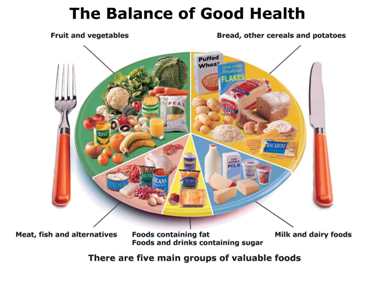|
Why is a healthy diet important for my oral health?
Every time you eat or drink anything sugary, your teeth are under acid attack for up to one hour. This is because the sugar will react with the bacteria in plaque (the sticky coating on your teeth) and produce the harmful acids. So it is important to keep sugary foods only to mealtimes, limiting the amount of time your mouth is at risk.
Acidic foods and drinks can be just as harmful to your teeth. The acid erodes the enamel, exposing the dentine underneath. This can make the teeth sensitive and unsightly.
A diet that is rich in vitamins, minerals and fresh produce can help to prevent gum disease. Gum disease can lead to tooth loss and cause bad breath. The diagram below is a good example of what you should eat as part of a healthy and balanced diet.

What is tooth decay?
Tooth decay damages your teeth and leads to fillings or even extractions. Decay happens when sugar reacts with the bacteria in plaque. This forms the acids that attack the teeth and destroy the enamel. After this happens many times, the tooth enamel may break down forming a hole or ‘cavity’ into the dentine. The tooth can then decay more quickly.
What foods can cause decay?
All sugars can cause decay. Sugar can come in many forms, for example: sucrose, fructose and glucose are just three types. These sugars can all damage your teeth.
Many processed foods have sugar in them, and the higher up it appears in the list of ingredients, the more sugar there is in the product. Always read the list of ingredients on the labels when you are food shopping.
When you are reading the labels remember that ‘no added sugar’ does not necessarily mean that the product is sugar free. It simply means that no extra sugar has been added. These products may contain sugars such as those listed above, or the sugars may be listed as ‘carbohydrates’. Ask your dentist if you are unsure.
Can food and drink cause erosion?
Acidic food and drinks can cause decay. Listed below are the ‘pH values’ of some food and drinks. The lower the pH number; the more acidic the product. Anything with a pH value lower than 5.5 may cause tooth decay. ‘Alkalines’ have a high pH number and neutralize the acid effects of sugars. PH 7 is the middle figure between acid and alkaline.
- mineral water (still) pH 7.6
- milk pH 6.9
- cheddar cheese pH 5.9
- lager pH 4.4
- orange juice pH 3.8
- grapefruit pH 3.3
- pickles pH 3.2
- cola pH 2.5
- red wine pH 2.5
- vinegar pH 2.0
Can I eat snacks?
It is better for your teeth and general health if you eat 3 meals a day instead of having 7 to 10 snack attacks. If you do need to snack between meals, choose foods that do not contain sugar. Fruit does contain acids, which can erode your teeth. However, this is only damaging to your teeth if you eat an unusually large amount.
If you do eat fruit as a snack, try to eat something alkaline such as cheese afterwards. Savory snacks are better, such as:
- cheese
- raw vegetables
- nuts
Can I eat sweets?
The main point to remember is that it is not the amount of sugar you eat or drink, but how often you do it. Sweet foods are allowed, but it is important to keep them to mealtimes.
To help reduce tooth decay, cut down on how often you have sugary snacks and drinks and try to sugar-free varieties confectionery and chewing gum containing Xylitol may help to reduce tooth decay.
Sugary foods can also contribute to a range of health problems including heart disease and being overweight.
What should I drink?
Still water and milk are good choices. It is better for your teeth if you drink fruit juices at meal times. If you are drinking them between meals, try diluting them with water.
Diluted sugar-free juices are the safest alternative to water and milk. If you make kool-aid or concentrated juices, be sure that the drink is diluted 1 part juice to 10 parts water. Some soft drinks contain sweeteners, which are not suitable for young children – ask your dentist or health visitor if you are not sure.
Fizzy drinks can increase the risk of dental problems. The sugar can cause decay and the acid in both normal and diet drinks can dissolve the enamel on the teeth. The risk is higher when you have these drinks between meals.
Should I brush my teeth after every meal?
It is important that you brush twice a day with a toothpaste containing fluoride. The best times are before breakfast and last thing at night before you go to bed.
Eating and drinking naturally weakens the enamel on your teeth, and brushing straight afterwards can cause tiny particles of enamel to be brushed away. It is best not to brush your teeth until at least one hour after eating.
It is especially important to brush before bed. This is because the flow of saliva, which is the mouth’s own cleaning system, slows down during the night and this leaves the mouth more at risk from decay.
Does chewing gum help?
Chewing gum makes your mouth produce more saliva, which helps to cancel out the acid in your mouth after eating or drinking. It has been proven that using sugar-free chewing gum after meals can prevent tooth decay. However, it is important to use only sugar-free gum, as ordinary chewing gum contains sugar and therefore may damage your teeth.
back to the top»
back to Preventive Dentistry
|
